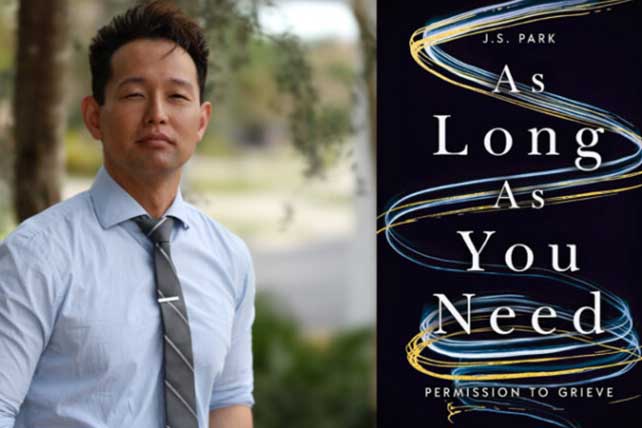(RNS) — “Everything happens for a reason” might be one of the least helpful things you can say to someone who just lost a loved one, according to veteran hospital chaplain J.S. Park.
But while Park understands why people grasp for what he calls “Swiss cheese theology” in moments of loss, working as an interfaith chaplain at a Level 1 trauma center in Tampa, Florida, has taught him that grief is less about letting go and moving on, and more about letting in and moving with. In his latest book, “As Long as You Need: Permission to Grieve,” Park draws on nearly a decade of sitting with people on the worst day of their lives, offering vivid stories from the bedside and his own life to show why an unrushed, authentic approach to grieving allows people to honor their loss for what it is.
RELATED: ‘There Are Many Worlds in Me’: Asian American Christians Reject Conformity
Religion News Service spoke to Park about how not to talk to the grieving, how Park lost and found his Christian faith as a chaplain and where he finds moments of resurrection in a career that routinely faces death. This interview has been edited for length and clarity.
What are some of the myths about grief you hope to debunk in this book?
The biggest myth I see is that grief is a poison to get past. There’s positive intent there, because the sadness of grief is so hard to deal with. But grief is part of our human process. Trying to insert future hope in the present loss can only harm us, because it’s rushing us towards a conclusion that so many of us are not ready for. The first step out of that myth is to not look away from grief, but to let it in. The reason that loss hurts so much is because that person, that dream, the thing that we lost meant so much to us. How do we honor that?
What have you found to be some of the most unhelpful ways to respond to grief?
There are sugar-coated cliches we use: This is God’s will for your life. Everything happens for a reason. God is using this to refine you. God needed another angel in heaven. We’re offering Swiss cheese theology. It’s handing someone a cobweb on the way down this abyss. I’ve seen it in pop culture too. Be strong. Just think positive. Phrases that try to wrap up grief in a single sentence can be some of the most harmful things you can say. What you’re really telling this person is, if you just believe this, then your grief will be gone. And it’s almost telling this person their loss doesn’t matter. Instead, the helpful thing would be to look it in the face, name what it is and validate feelings.
What responses do you find more helpful?
Everyone grieves differently. We know the people we love. And if we pause for a moment and empathize, we can find what they need. It’s not necessarily going to be words. Sometimes we’re tired, we’re hungry, or we just want to do something fun. I remember one time I was going through something particularly difficult, and I texted my friend and said: Can I just call you, but I don’t want you to say anything? Just once in a while, breathe kind of loud on the phone so I know you’re there. That’s what I needed at the time.
You write that you lost your faith in two parts. How so?
I did lose my faith during my residency, and since then, I probably lost my faith a couple more times. It’s come back, but each time very different. That first time, I lost it in two stages. The first stage was that sugary scaffolding or Swiss cheese theology. Ideas like, if I remain positive, or if I read the Bible enough, things will turn out all right. These kind of transactional ideas about God all fell through. My patients’ suffering just seemed random and haphazard. I would say the harder loss of faith was my loss of a complete sense of safety and security in the universe. I was questioning, is everything without meaning or purpose? I see what the nurses and doctors do, I even see what the machines do, but what does God do? My trust in this person was broken. It almost felt like at the heart of the universe was this neglectful force.

